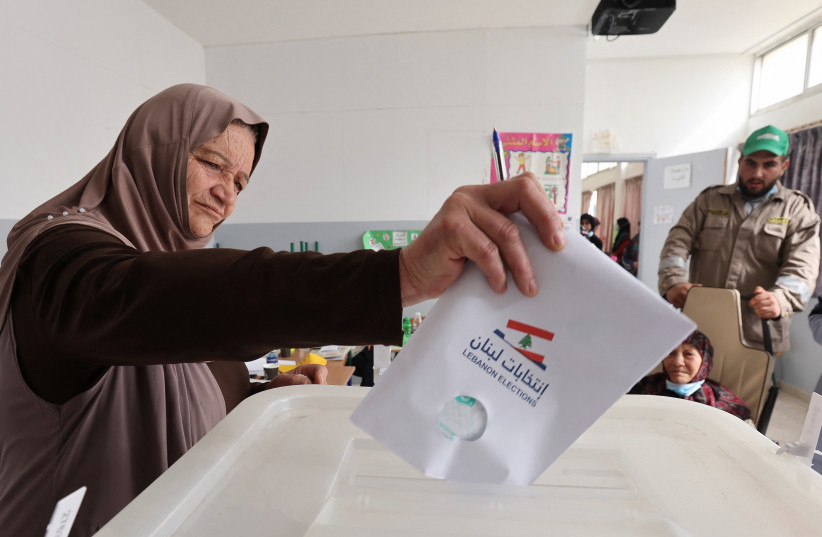Reports that Hezbollah and its allies have not performed as well as expected in the Lebanese elections may have ramifications. The pro-Iranian group may suffer a setback, the first in a decade or more.
Hezbollah has tried to consolidate power over all institutions in Lebanon, either directly using the weapons it has, or through partnerships with Druze and Christian politicians. Now, the terrorist group may be losing steam.
Pro-Iranian groups in the region are suffering setbacks because people are tired of the poverty, war and chaos they bring. Iran’s policy is to go into countries, find local groups that can be provided weapons and then use them to hijack the country like an internal mafia army. Then, once Iran has its allies in power, or holding a part of the government, it uses them to siphon off resources from the country, bankrupt it, hollow it out and turn it into a shell.
Once the ruined country is a shell, the Iranians blame Israel and the US and then use this as an excuse to find “resistance” forces in the country, pouring in arms. A bankrupt country is then taken over by armed militias that put up checkpoints around their areas.
Then they stockpile weapons, fund extremism and begin to sell and traffic drugs from the shell of the country, which then falls into poverty and sectarian chaos. Iran wins when countries fall apart.

Iran’s goal was to destroy Lebanon and turn a peaceful, successful state into an Iranian base. It did the same in Iraq with the Hashd al-Shaabi, an umbrella group of militias. It then got the militias into parliament via the Fatah Alliance and groups such as the Badr Organization. In Yemen, it uses the Houthis.
Lebanon has been bankrupted, and Hezbollah even helped cause the massive explosion in Beirut’s port via its corruption of institutions. It illegally occupies southern Lebanon and stockpiles missiles and drones. But when it comes to elections, it appears that some people are not entirely happy with what Hezbollah did to Lebanon in the 22 years since Israel withdrew from its southern region in 2000.
IN THE old days, the ruination of Lebanon was said to be acceptable because Hezbollah was “resisting” Israel. According to that logic, even if the country was an armed terrorist base, this was okay because the excuse was to fight Israel.
The Gaza Strip was also destroyed by Iranian-backed Hamas under the same excuse. It had to “resist,” so Gaza had to be held hostage. Yemen must “resist,” so it is hollowed out. Iraq is “resisting,” so it is poor and ruined.
Countries that prefer peace and stability can have education, the arts and profit. Iran’s friends have only poverty. But when there are elections – when Tehran can’t control everything – the people sometimes resist Iran’s control.
In Lebanon, it seems Iran knows that its friends did not perform well. Iranian pro-government news agencies such as Tasnim and Fars have not lauded Hezbollah’s success. Iran sees failure, but the question is whether Hezbollah will accept its failure at the ballot box or provoke a new conflict to distract.
In the past, the terrorist group did everything possible to hijack the presidency of Lebanon and even used weapons to show its power in Beirut. Hezbollah refuses to concede that anyone else might control Lebanon.
The election returns will be monitored carefully to see how the sectarian reserved seats are divided. It appears that Christian parties that oppose Hezbollah may have defeated those that back it. Similarly, the Druze and Sunni vote will be closely watched.
“An opposition candidate also made a breakthrough in an area of southern Lebanon dominated by Hezbollah,” France24 reported.
“Elias Jradi, an eye doctor, won an Orthodox Christian seat previously held by Assaad Hardan of the Syrian Socialist Nationalist Party, a close Hezbollah ally and MP since 1992, two Hezbollah officials said. ‘It’s a new beginning for the south and for Lebanon as a whole,’ Jradi told Reuters,” the report said.
In the past, Hezbollah has assassinated critics such as Lokman Slim. Is it possible that it may begin a new wave of assassinations if it fears critics are rising in Lebanon? Or could Hezbollah provoke a crisis in the Golan Heights where it has agents in Syria?
Much remains to be cleared up about how Hezbollah will react. Its leadership is aging, and it has fewer friends in the region. The only thing it still has is its illegal masses of weapons.
